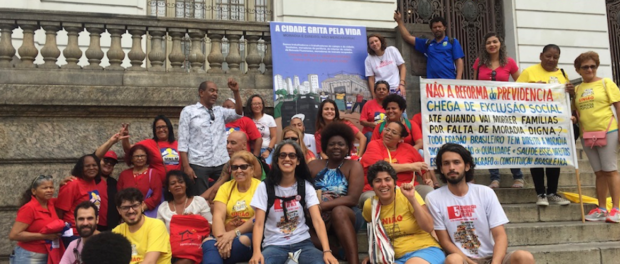
On Monday October 7, Rio de Janeiro residents, community leaders, and activists joined outside City Hall to demand their constitutional right to housing. Various movements—including Movimento dos Trabalhadores Sem Teto (Homeless Workers’ Movement), Uniāo Nacional por Moradia Popular (National Union for Popular Housing), Movimento de Luta nos Bairros, Vilas e Favelas (Neighborhood, Village, and Favela Resistance Movement), and Movimento Nacional de Luta pela Moradia (National Movement for the Fight for Housing)—united to demand a full transfer of resources from the State Social Housing Fund (FEHIS), and that the State build a participatory, democratic public policy to address Rio’s housing deficit.
Article 6 of Brazil’s Constitution, passed in 1988, guarantees the right to housing as well as health, work, and education. However, despite a high-visibility housing program promoted by the federal government in the run-up to the 2016 Olympic Games, the number of homeless people in Rio tripled to 15,000 between 2013 and 2016. On the national level, 11.4 million Brazilians live in informal settlements: only 27.5% of them have regular access to electricity and 32.7% to proper sanitation.
From City Hall, protesters marched through Rio’s downtown area, stopping at the Ministry of Finance before reaching their final destination at the Rio de Janeiro State Legislative Assembly (Alerj), all the while chanting “We want housing, health, and education without evictions,” referencing the city’s history of evictions in a context of favela gentrification and “upgrading” programs. RioOnWatch accompanied the march and asked protesters to describe why they were there.
“It isn’t just a call for housing. It is an act of citizenship, it is an act to rescue our dignity, because housing is the gateway to other rights.” — Elizeth Napoleāo, Movimento Nacional de Luta pela Moradia (MNLM)

“Sometimes people think that homelessness is only [about] a person who lives on the street, but really homelessness is a problem of housing… That person who receives a minimum wage, that spends more than half of their salary on rent is also homeless. That person who doesn’t have the means to pay rent and lives in their parents’ house, their brother’s, the house of a friend, they too are homeless. That person who lives in an unhealthy situation, in bad conditions in areas where there is no sanitation, where they have no way to sleep, without a bathroom in their home, this person is homeless too.” — Felipe Nin, União por Moradia Popular (UMP-RJ)
“The poor homeless people continue to be homeless in our city. This is why these national movements together with various favela and community movements have come to the streets today, to say that it is absurd what this government has done against our people.” — Juliete Pantoja, Movimento de Luta nos Bairros, Vilas e Favelas (MLB)
“When you go to someone’s home, the first thing you see is that that person has things they have held on to, that they value. So, we need to respect the homes of others. The city and the state disrespect the homes of people the moment they impose certain rules which they themselves would not accept in their own homes.” — Marcello Deodoro, Federation of Favelas of the State of Rio de Janeiro (FAFERJ)




